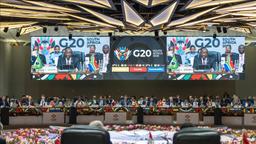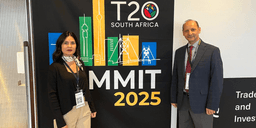
The WTO Public Forum was held in September with the theme It is Time for Action.
The WTO Public Forum was held in September with the theme "It is Time for Action". The aim in this year’s Forum was to examine how trade contributes to a greener and more sustainable future. The WTO organizes Public Forum event annually as an outreach activity to discuss the latest developments in global trade and to propose ways of enhancing the multilateral trading system. It provides a unique platform for interested stakeholders from academia, think tanks, civil society, business, and political spheres.
As the debate on climate change increasingly affects trade relations, the recent WTO event focused on trade-environment nexus: i.e. how trade can facilitate access to environmental goods, services and technologies; helps to limit global warming to 1.5 degrees above pre-industrial levels as set out in Paris Agreement.
134 Sessions held during the Public Forum were mainly centered around three sub-themes: the role of the services sector in sustainable trade; inclusive policies for the advancement of green trade; and digitalisation as a tool for the greening of supply chains.
Türkiye’s Ministry of Trade hosted a Session titled Bridging the Digital Divide for Transition to a Greener Economy with the participation of panelists from academia, think tanks and the WTO.
Dr. Sait Akman, Director of G20 Studies Center represented TEPAV in the session. The idea of the panel was to open a discussion on the benefits of digital transformation and to explore if and how mitigating the digital divide (i.e. gap between demographics and regions that have access to modern ICT-Information and Communication Technologies and all digital technologies and those that do not) could help developing countries in their transition to a greener economy. It is apparent that not all countries benefit from technological developments in digital sphere equally, and a digital gap precludes many parts of the society from benefiting digitalisation. Bridging the digital divide can help developing countries to better compete in an increasingly greener economy and attain climate commitments.
Dr. Akman argued that despite an increasing access to internet worldwide, the digital gap is constantly widening with the development of new technologies such as artificial intelligence, machine learning, and smarter devices. The divide leads to a vicious circle, i.e. further inequality and poverty in developing countries. Therefore, steps to harness digital technologies to overcome the digital divides for human capital development are essential. Spreading digital dividends and benefits cannot and should not be simply restricted to making internet more affordable and accessible but also should be supported by policies contributing the spread of technological benefits and reduction of the risks. Akman called attention that digitalization can create new opportunities to optimize energy use and potentially reduces greenhouse gas emissions referring to studies led by leading international institutions such as OECD and the World Bank, ITU and others. There are multiple ways to tackle climate challenges through digital technologies, including establishing greener supply chains, engaging SMEs in the green production processes, adopting renewable energy, and facilitating circular economy. Accordingly, mitigating the digital divide and involving small and medium-sized enterprises and businesses in digital transformation can help reducing carbon emissions, and reducing the use of fossil-fuel resources.
However, climate-beneficial digitalization can be achieved through setting proper regulatory framework and accountable institutions and improving digital skills so that individuals and firms know how to properly utilize digital technologies.
For the Session: https://www.wto.org/english/forums_e/public_forum23_e/pf23_session_fullpage_e.htm?session=546 .
For WTO Public Forum: https://www.wto.org/english/forums_e/public_forum23_e/public_forum23_e.htm




